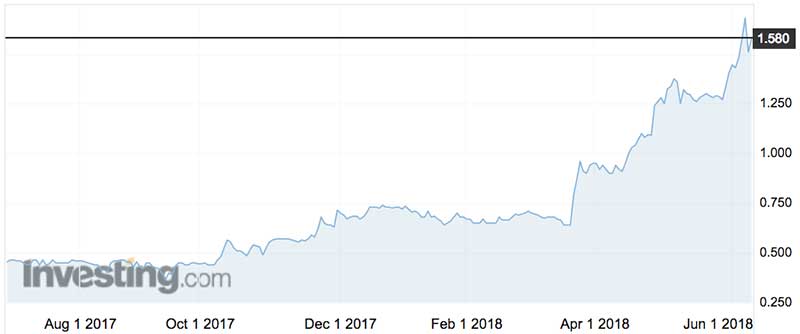Why Clover Corp is outperforming its bigger infant formula rivals
Health & Biotech
Clover Corp has outperformed bigger rivals such as A2Milk and Bellamy’s on the China milk thematic over the past year — and some reckon the surge in its shares has further to go, with Europe demand likely to give earnings another leg up.
Clover (ASX:CLV) has been around for the best part of a decade, but its shares have only recently gained traction, thanks to its exposure to the key China market.
Surging demand here has boosted the shares to all-time highs of $1.68 recently (they have more than doubled in the past three months) which has prompted some smart money, such as the Thorney family, to sell down their holding in the company.
Even so, stockbroker Ord Minnett has a ‘buy’ recommendation on the shares, since it reckons the company will enjoy solid earnings growth over the next few years.
Clover’s core product is encapsulated tuna oil, which uses docosahexaenoic acid (DHA), an omega-3 fatty acid recommended for brain health, along with boosting the health of the heart and eye.
It is particularly sought after for the infant formula market, which accounts for the bulk of the company’s sales at present.
Critical to Clover’s success is a process developed with the CSIRO for encapsulating tuna oil which virtually eradicates the distinctive – and off-putting – ‘fishy’ smell and taste of the product.
Rising demand for fish oil products and especially Clover’s technical advantage over rivals underpins the Ord Minnett recommendation for Clover shares.

“These drivers deliver an expected EPS compound annual growth rate of 28 per cent over fiscal 2018–21,” it told clients in a recent note.
Indicative of the growth underway, revenue surged by 60 per cent in the six months to January, with sales growing at the same pace in the three months to April.
And earnings have strong leverage to the revenue growth, surging by 200 per cent in the January half alone.
Underpinning the earnings growth was an earlier decision to buy its own spray dryer, which enabled it to bring a high cost portion of the production process in-house, helping to lift margins.
This one step alone should help to lift margins to closer to 30 per cent by 2021 from around 24 per cent at present, Ord Minnett reckons.
As well, Clover has just bought its factory in Melbourne, which it had been leasing, which with an upgrade now underway, at an all-up cost of $4.5 million. It had net cash of around $2 million when it ruled off the accounts in January.
Buying the freehold of its plant will make it easier to upgrade production capacity in the future.
In this connection, Clover is developing new products targeting the childrens and the seniors market, with some trials underway.
The specific product here is a high concentrated form of DHA used in a chewy candy, with additional products being trialled for use in the drinks, sports bar and nutritional powder markets.
The other key driver is Europe where the government wants infant formula makers to double the DHA content by 2020.
Europe makes up only a small part of Clover’s sales at present, but this may change over the next few years.